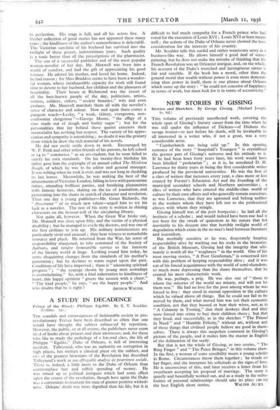A STUDY IN DECADENCE
Prince of the Blood: Philippe Egalite. By E. V. Scudder. (Collins. t5s.)
THE scandals and extravagances of fashionable society in pre- revolutionary France have been described so often that one would have thought the subject exhausted by repetition. However, the public, or at all events, the publishers never seem tirzd of books about princes and their mistresses, and, for those who like to study the pathology of a leisured class, the life of Philippe " Egalite," Duke of Orleans, is full of interesting incident. Talleyrand, who was an authority on corruption in high places, has written a classical piece on the subject, and on of the greatest historians of the Revolution has described Talleyrand's work as une effroyable analyse de pourriture sociale. There is, indeed, a little more to the Duke of Orleans than commonplace lust and selfish spending of money. He was mixed up in political intrigues which had some effect upon the course of the revolution, though here again the Duke was a convenient instrument for men of greater positive wicked- ness. Orleans' death was more dignified than his life, but it is
difficult to feel much sympathy for a French prince who had voted for the execution of Louis XVI ; Louis XVI at least meant well ; the actions of the Duke of Orleans never showed the least consideration for the interests of his country.
Mr. Scudder tells this sordid and rather wearisome story in a business-like way. He allows himself a good deal of scene- painting, but he does not make the mistake of thinking that the French Revolution was an Orleanist intrigue, and, on the whole, his account of the Duke's wretched and incongruous career is fair and sensible. If the book has a moral, other than the general moral that wealth without power is even more demoral- ising than power in itself, there is one phrase about Orleans which sums up the story : " he could not conceive of happiness in terms of work, but must look for it in terms of eccentricity."










































 Previous page
Previous page